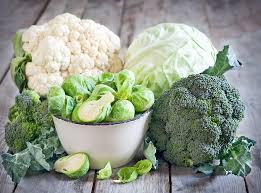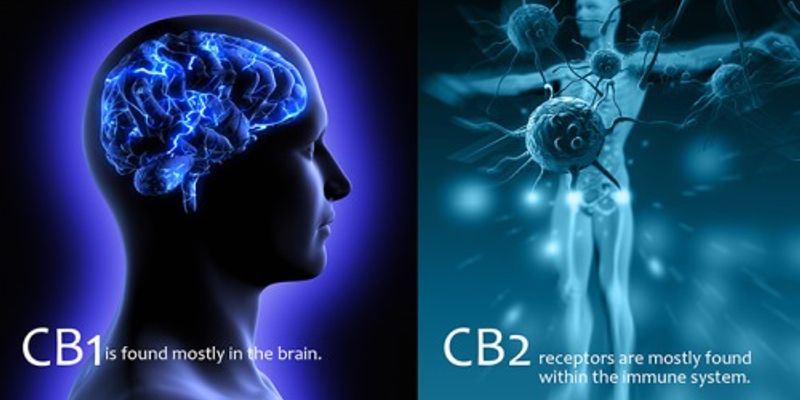

Cancer & the CB2 Receptor
This entry was posted on April 18, 2023.
A compound in cauliflower, cabbage, broccoli, Brussels sprouts, and other leafy greens exerts anti-cancer effects through the endocannabinoid system.
The cannabinoid receptor CB1, primary target of THC in the brain, is known for mediating the cannabis high. And its counterpart CB2, mainly expressed in immune cells throughout the body, is understood to play an important role in inflammatory processes. These abstractions are accurate as far as they go, but as with anything related to the endocannabinoid system, reality is far more complex.

A recent article on the passing of Raphael Mechoulam noted that the esteemed scientist believed CB2 should be a focus of future cannabinoid science. The CB2 receptor interacts with THC, CBD, endocannabinoids, and other compounds in a multitude of organs including skin and bone.
Recent research — including papers co-authored by Mechoulam well into his 80s — has confirmed that aberrant CB2 signaling is implicated in a raft of autoimmune, neurodegenerative, metabolic, and psychiatric disorders. CB2 is also an increasingly hot topic in cancer research.
Prostate Cancer & a New CB2 Ligand
Three studies from the first few months of 2023 probe the function of CB2 in three different cancer models. While their findings are complex and not necessarily conclusive, they contribute to a growing body of knowledge about the potential efficacy of cannabinoids in cancer treatment.
A paper published in February in International Journal of Molecular Sciences1 offers two insights for the price of one: first, another look at how the CB2 receptor functions in a cellular model of cancer; and second, new evidence that a compound called 3-3′-Diindolylmethane (DIM) — present in cruciferous vegetables such as cauliflower, cabbage, broccoli, Brussels sprouts, and a number of leafy greens — exerts anti-cancer effects through the CB2 receptor.
By testing DIM on two different human prostate cancer cell lines, the Italy- and UK-based researchers observed that the compound activated naturally expressed CB2 receptors in both lines — and that in one, known as “PC3,” CB2 activation led to cell death, an effect that was reversed when the researchers blocked the CB2 receptor with an antagonist.
DIM was already known to have an anti-cancer effect more broadly. What had not been previously observed, the authors note, is CB2’s role in mediating this effect in a human cancer cell line. “We can conclude that DIM is a CB2 receptor ligand with a potential anti-prostate cancer effect,” they write.
If true, cruciferous vegetables join saffron, black pepper, cloves, oregano, and some other spices as foods containing compounds that interact with the CB2 receptor in beneficial ways.
But don’t head to the market for a cartload of cauliflower and cabbage just yet. The concentrations of DIM used in the study are too high to be obtained through diet alone, the authors note, and administration by supplements may be required.
Colon Cancer: Case Closed?
A second February 2023 study in the International Journal of Molecular Sciences2 comes to a similar conclusion regarding CB2’s role in colon cancer. Researchers in Israel investigated how the CB2 receptor functioned in a mouse model of colon cancer (utilizing “knockout” mice missing the receptor altogether), and they analyzed genomic data in a large human population to determine the relationship between CB2 variants and colon cancer incidence.
In both cases, the authors write, their findings indicate that “endogenous CB2 activation can modulate the immune response and consequently reduce tumorigenesis” and that “CB2 protects against the development of colon cancer.”
Yet despite their seemingly unambiguous findings, the authors also acknowledge that previous studies have come to very different conclusions about the role of CB2 in cancer.
“CB2 has been investigated in multiple cancer types and models of inflammation,” they write, “and there are controversial results regarding the effect on tumor progression.” For example, past studies have found that CB2 expression is associated with a poor prognosis in humans; that CB2 antagonists, or blockers, suppress tumor growth; that CB2 activation promotes tumor growth in models of colon cancer; and that CB2 agonists inhibit tumor growth. The researchers attribute this ambiguity to variations in animal cancer models and cancer cell lines.
Lung Cancer: A Different Answer
Sure enough, a different study published a month earlier in Frontiers in Immunology3 using a different mouse model of non-small cell lung cancer seems to show something else altogether.
Within knockout mice deficient of CB2 in the “tumor microenvironment” — the normal cells, molecules, and blood vessels that surround a tumor cell, including immune cells expressing high levels of CB2 — a team of Austria-based researchers observed a reduction in tumor burden relative to “wild-type” mice. They also found that CB2-deficient mice responded significantly better to a form of immunotherapy known as anti-PD1.
Together, these findings indicate that CB2 receptors in the tumor microenvironment of non-small cell lung cancer “may act as an immunosuppressor … thereby promoting tumor growth.”
You read that right: the opposite of what the other two papers found. Be that as it may, it still seems clear enough that CB2 modulates cellular immune response in ways directly relevant to cancer progression — and that the clinical implications of this link still need to be worked out.
The Health Cure has more than 13 years of experience in the field of health, various plant medicines and lifestyle.
Already able to help tens of thousands of people all over the world with plant medicines such as Graviola, Kava, Cannabis THC/CBD oil and other Cannabinoids and various holistic therapeutic treatments. At the health centre, The Health Cure runs courses in lifestyle, education in mindfulness. Also for different retreats. Contact The Health Cure for information.
Tags; The Health Cure, The Health Cure Netherlands, The Health Cure UK, The Health Cure France, RSO Oil, Medicinal Cannabis, Rick Simpson, Run From The Cure, Cancer Cure, Cancer Cells, Cannabis, Marijuana, Dr. Cristina Sanchez, Cannabis oil, Forbidden Cure, Medicine, Cure all, Cannabinoids, CBD, Cannabidiol, Parkinson, Multiple Sclerosis, Seizures, Documentary, Testimonials, THC Oil Cures Cancer, Parkinsons, Tremors, Cannabis Oil Cures Cancer, Hemp Oil Cures Cancer, Endocannabinoids, Medical Cannabis, CBG, Skin cancer, Hemp-cream, THC Cream, healing paths, clinical healing, hypnosis and regression, The Health Cure since 2009, Ayahuasca Medicine, DMT, Shaman, Nature, Grounding, Earthing, www.thehealthcure.org, Dogs, Cats, Horses, All Pets, Endo cannabinoids System, Alzheimer, phoenix-tears, Liver Cancer Stage 4, Breast Cancer, Energy, Qi Gong, shaman, Sage, shamanic healing, Ayahuasca, Healing Plants, Grounding, MMS, Jim Humble, Miracle Mineral Supplement, Rewired, Dr. Joe Dispenza, Gaia, Series, micro-dosing psilocybin, Mindfulness, Sleep, Plant medicine, Paleo Lifestyle, Qigong, Chinese Healing, Shamanism, Yoga, Yogic Path, Spiritual, Love, Ancient Knowledge, Pain, Healthy Lifestyle, Nutrition, Monsanto, Documentary, Superfood, Healthy Foods, Lifestyle,
Parkinson's, Placebo, Nervous System, Mind Body Healing, Quantum Leap, Nature Of Reality, Mind Body Healing, Subconscious Mind, Energy Healing, Life-force, Wellbeing, Love, Peace, Joy, Alive, Gaia, Ickonic, Bruce Lipton, Deepak Chopra, Dr. Joe Dispenza, Gregg Braden, Randy Veitenheimer, Dr. Wayne Dyer, Eckhart Tolle, Marcel Messing, Sound of Creation, Geometry, Frequency, Medical Intuition, Sacred Power, Secrets Of Sleep, Awake, Insomnia, Narcolepsy, Retreats, Retreat, Reiki, Quantum Touch, Meditation, Affirmations, Energy & Vibration, Balance, Abundance, Change Your Thoughts, Change Your Life , Gratitude, Letting Go, Subconscious Mind, Chakras, Energy Wheels, Acsension
DISCLAIMER:
The information provided by The Health Cure, its parents or affiliates (“we,” “us” or “our”) on www.thehealthcure.org (the “Site”), including this Blog, is for general informational purposes only. All information on the Site is provided in good faith, however we make no representation or warranty of any kind, express or implied, regarding the accuracy, adequacy, validity, reliability, availability or completeness of any information on the Site. The views and opinions expressed in this Blog are those of the authors and do not necessarily our official policy or position of any other agency, organization, employer or company. Assumptions made in the blogs are not reflective of the position of any entity other than the author(s) – these views are always subject to change, revisions, and updates at any time. There is no obligation to purchase any product mentioned. The Site may contain (or you may be sent through the Site links to other websites or content belonging to or originating from third parties or links to websites and features in banners or other advertising. Such external links are not investigated, monitored, or checked for accuracy, adequacy, validity, reliability, availability or completeness by us. We do not warrant, endorse, guarantee, or assume responsibility for the accuracy or reliability of any information offered by third-party websites linked through the site or any website or feature linked in any banner or other advertising. We will not be a party to or in any way be responsible for monitoring any transaction between you and third-party providers of products or services. The Site cannot and does not contain medical or health advice. The medical or health information is provided for general informational and educational purposes only and is not a substitute for professional advice. Accordingly, before taking any actions based upon such information, we encourage you to consult with the appropriate professionals. We do not provide any kind of medical or health advice. The use or reliance of any information contained on this site is solely at your own risk.
